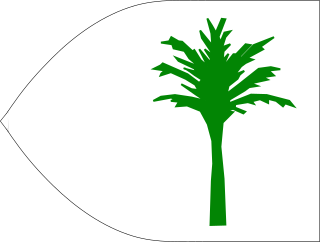
The Kanem–Bornu Empire existed in areas which are now part of Nigeria, Niger, Cameroon, Libya and Chad. It was known to the Arabian geographers as the Kanem Empire from the 8th century AD onward and lasted as the independent kingdom of Bornu until 1900.
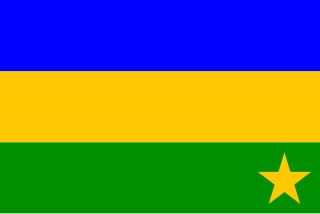
The Kanuri people are an African ethnic group living largely in the lands of the former Kanem and Bornu Empires in Niger, Nigeria, Chad, and Cameroon, as well as a diaspora community residing in Sudan. Those generally termed Kanuri include several subgroups and dialect groups, some of whom identify as distinct from the Kanuri. Most trace their origins to ruling lineages of the medieval Kanem–Bornu Empire, and its client states or provinces. In contrast to the neighboring Toubou or Zaghawa pastoralists, Kanuri groups have traditionally been sedentary, engaging in farming, fishing the Chad Basin, trade, and salt processing.

The Bayero University Kano (BUK) is a university situated in Kano, Kano State, Nigeria. It was founded in 1975, when it was renamed from Bayero University College and upgraded from University College to University. It is the first university in Kano State, North-western Nigeria.

Rabih az-Zubayr ibn Fadl Allah, also known as Rabih Fadlallah and usually known as Rabah in French, was a Sudanese warlord and slave trader who established a powerful empire east of Lake Chad, in today's Chad.

Barewa College is a college in Zaria, Kaduna State, northern Nigeria. Founded in 1921 by British governor general Hugh Clifford, it was originally known as Katsina College. It switched its name to Kaduna College in 1938 and to Government College, Zaria in 1949 before settling on Barewa College. It is one of the largest boarding schools in Northern Nigeria and was the most-celebrated post-primary schools there up to the early 1960s. The school is known for the large number of elites from the region who attended and counts among its alumni include Tafawa Balewa who was Prime Minister of Nigeria from 1960 to 1966, four heads of state of Nigeria. The school is located along Gaskiya road in the Tukur -Tukur area of Zaria.

Shehu Muhammad al-Amîn al-Kanemi was an Islamic scholar, teacher, religious and political leader who advised and eventually supplanted the Sayfawa dynasty of the Kanem–Bornu Empire. In 1846, al-Kanemi's son Umar I ibn Muhammad al-Amin became the sole ruler of Borno, an event which marked the end of the Sayfawa dynasty's 800 year rule. The current Shehu of Bornu, a traditional ruler whose seat remains in modern Borno State, Nigeria, is descended from al-Kanemi.
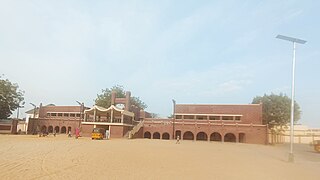
The Borno Emirate or Sultanate, sometimes known as the Bornu Emirate, is a traditional Nigerian state that was formed at the start of the 20th century. It is headed by the descendants of the rulers of the Bornu Empire, founded before 1000. The rulers have the title Shehu of Borno. The traditional emirate of Borno maintains a ceremonial rule of the Kanuri people, based in Maiduguri, Borno State, Nigeria, but acknowledged by the 4 million Kanuri in neighbouring countries.
The Dikwa Emirate is one of the successor states to the old Bornu Empire, a traditional state within Borno State, Nigeria. It was established in 1901 at the start of the colonial period after the Bornu empire had been partitioned between the British, French and Germans.
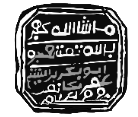
Bukar or Bukar Kura bin Umar al-Kanemi was Shehu of Borno from 1881 to c. 1884.
Ibrahim or Ibrahim bin Umar al-Kanemi was Shehu of Borno from c. 1884 to c. 1885.

Ashimi or Hashim bin Umar al-Kanemi (1840s-1893) was Shehu of Borno from ca.1885 to 1893.

Shehu Umar Sanda ibn Ibrahim Kura al-Kanemi was the Shehu of Borno from 1922 to 1937. He was the son of Shehu Ibrahim Kura of Borno and brother of Shehu Abubakar Garbai.

Shehu Mustafa Ibn Umar El-Kanemi was the Shehu of Borno from 1974 to 2009.
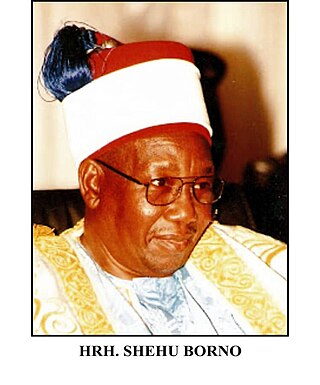
Abubakar Ibn Umar Garba Al Amin El-Kanemi Shehu Of Borno is the Shehu, or traditional ruler, of the Borno Emirate in northeast Nigeria.

Hausa literature is any work written in the Hausa language. It includes poetry, prose, songwriting, music, and drama. Hausa literature includes folk literature, much of which has been transcribed, and provides a means of recording, preserving, and transmitting knowledge, especially in regard to social, psychological, spiritual, or political roles.
The Ahmadu Bello University (ABU) is a public research university located in Zaria, Kaduna State, Nigeria. It was opened in 1962 as the University of Northern Nigeria. The university has four colleges, three schools, 18 faculties, 110 academic departments, 17 centres, and seven institutes with over 600 professors, about 3000 academic staff and over 7000 non-teaching staff. The university has over 400 postgraduate programmes reflecting its strife to become a postgraduate studies-centred university. The university operates from two campuses in the ancient cosmopolitan city of Zaria, the Samaru Campus where the Senate Building and most of the faculties are located and the Kongo Campus, hosting the faculties of Law and Administration. It has been adjudged to be the largest university in Sub-Saharan Africa, in terms of land occupied, owing to the numerous buildings it has.
Gombe-Abba was established by Modibbo Buba yero, the student of Usman Dan Fodiyo, after the 1804 Jihad war. It is located about a kilometre off the Gombe - Kano highway, near a river and on a hilly area. Gombe Abba is the first capital of Gombe Emirate and inextricable part of Gombe history.

Muhammadu Mai Maina (1874–1964) was the first chief of Askira. He worked as an interpreter for the Northern Nigeria colonial government from 1895 to 1913, when he was appointed Chief of the Margi District in Bornu. In 1917, he resigned from this position and worked as a trader in Potiskum. Later, he founded the town of Askira and was appointed its chief in 1921, a position he held for over forty years. In 1958, he published Labarin Maimaina Na Jega, Sarkin Askira, a memoir about his early career as an interpreter. In 1961, he became a member of the Northern Region House of Chiefs.
Galadima is a historical title that referred to a high-ranking official or nobleman within various states of the historical central Sudan region, including the Hausa Kingdoms, Kanem-Bornu, and the Sokoto Caliphate. The title was typically held by individuals responsible for overseeing administrative, military, or diplomatic affairs. Although the exact roles and responsibilities of the Galadima varied across different polities, it was consistently associated with influential and authoritative figures. Today, the title exists as an honourific in most states in Northern Nigeria.

















